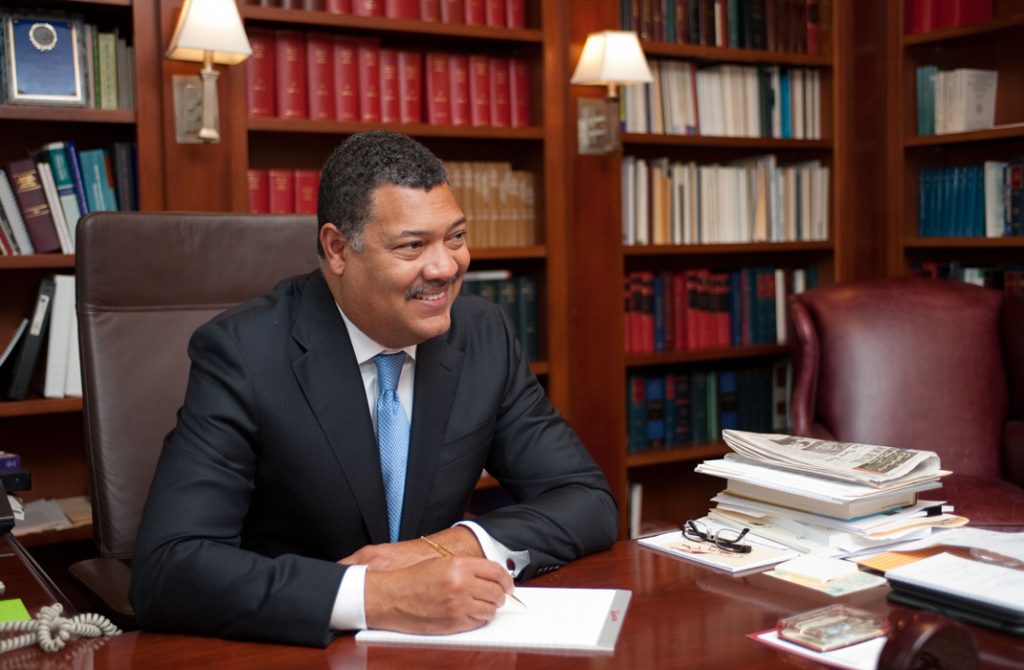This summer Boston College Law School hosted the 5th annual International Deans’ Meeting. Approximately 40 deans from around the world are part of the informal consortium. It is a chance to discuss trends and practices across disciplines and borders, outline similar challenges and goals, and brainstorm potential joint projects.
Our theme this year was “Experiential Learning in the Global Legal Environment.” Among this year’s attendees, three of BC Law’s own partner institutions were present: ESADE Law School in Barcelona, where Boston College has a longstanding student exchange; Pontificia Universidad Católica de Chile (PUC), where we are establishing a transnational interdisciplinary clinic; and Bucerius Law School in Germany. Bucerius has developed a new LL.M. in law and business with a four-month externship component, and we have begun discussions on how we might partner with them to bring these opportunities to our own students—an initiative that came directly from this June meeting. Many other discussions are ongoing.
This summer the ABA also revised the law school accreditation standards, which now include a requirement that all graduates have six credits of skills training. Fortunately, experiential learning and global engagement are subjects quite close to my heart. We have made experiential learning efforts at BC Law a high priority, opening our new Center for Experiential Learning this fall. The Center brings all of our programs under one roof, allowing for a more holistic approach to real-world training. It’s already spurred new outreach to the community and innovative programs, including a new partnership with “Smarter in the City,’ a start-up incubator in Boston’s Roxbury neighborhood, where our students provide legal advice to entrepreneurs from low-income communities.
But our experiential learning efforts cannot—and should not—be regional in nature. My own scholarship focuses on global migration and cosmopolitanism, and I help lead a research group on those subjects at the Contending Modernities project sponsored by the Kroc Institute for International Peace Studies. The message from this research is clear: The world is changing, traditional borders are dissolving, and we must think long and hard about how law will be practiced in the future when considering what kind of placements we offer today.
That’s why conversations like those that occurred at the international deans’ meeting are so important. Incredible opportunities become available when we expand our horizons and begin to think of experiential learning as a truly global exercise. The challenges—complexities in language and customs, expenses in overseas travel and support for students, differences in programs (not to mention the law itself)—can also be strengths, when tackled together with partner institutions. Real synergies form that carry everyone forward.
Now, more than ever, we must consider peers and partners beyond the United States. Brainstorming leads to relationship building, which leads to out-of-the-box thinking and collaborations that will benefit our students.
Here’s why we need to think globally:
1. Jobs. We all know experiential learning is a key part of legal education’s present and its future. But when we focus only on domestic opportunities, we miss the bigger picture. Legal hiring is still intensely local in this country, but the world is moving on without us. How do we expand placement choices for our graduates? Forming partnerships and feeder programs with international institutions gives our students the experience of working overseas and opens up new opportunities for them in the job market.
2. Reputation. When we send talented students to another school overseas, we begin to build our reputation, both with the faculty of that institution and with the employers with which those students are placed. A strong and successful program gets noticed by our peers and can lead to all sorts of other benefits and opportunities for us. By embracing a global approach, we take a leadership role in shaping the future of the legal profession—something all law schools should strive to do.
3. Justice. We are all more interconnected than ever before, and this idea of a truly global community is getting closer to reality. With that change come legal and ethical challenges: How do we effectively deliver justice to people with drastically different backgrounds and experiences? How do we reconcile different laws and customs to ensure that all people are treated fairly and with compassion? Law schools and law faculty should lead the way in this fight. If we remain focused on our own viewpoint and our own best interests, we risk putting up more walls in a futile effort to protect the past.


